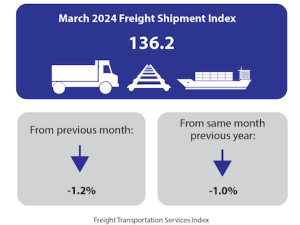Bitter cold impedes U.S. grain, hog shipments; threatens wheat
By: Reuters | Jan 23 2014 at 03:08 PM | Intermodal
Bitterly cold weather slowed grain and livestock shipments around the central United States on Thursday and threatened to damage the dormant winter wheat crop, sending futures prices higher, industry sources and meteorologists said.
Temperatures plunged to the single-digits to below zero Fahrenheit across the northern Midwest and Plains, and even colder conditions were expected early next week, forecasters said.
Cash premiums for corn delivered to processing plants and grain elevators climbed as the cold weather stalled truck and rail shipments. Ice buildup on rivers impeded movement of grain barges from the heart of the farm belt to Gulf Coast export terminals.
The second brutal blast of cold to hit the region this month raised concerns about the dormant winter wheat crop. Snow in the northern and eastern Midwest this weekend could help insulate plants from yield-sapping winterkill, but snow cover in some other areas might not be enough.
“Snow cover will remain quite thin across the western Midwest and eastern Plains, and some winterkill damage is currently expected there by Tuesday and Wednesday mornings,” said Don Keeney, senior agricultural meteorologist with MDA Weather Services.
“The highest risks will be across central Illinois, northern Missouri, and eastern Nebraska as lows are expected to dip to -5 to -10,” added Keeney. “Thus, some damage is likely to wheat in about a quarter of the Midwest belt and about 10 percent of the Plains belt.”
U.S. wheat futures on the Chicago Board of Trade rallied to a one-week high on crop damage worries.
ICY RIVERS
Though consistent barge traffic this winter has kept a narrow shipping channel largely open on the Illinois River, ice buildup has slowed navigation and increased dangers to boats.
Barge traffic was breaking up surface ice, but the ice floes were stacking up and refreezing in larger blocks at locks and dams, known in river parlance as gorging, making the locks more difficult to open and close.
At least two barges containing liquid urea fertilizer were taking on water after their hulls were ruptured by heavy ice near Havana, Illinois, on Thursday morning, said U.S. Coast Guard spokesman Colin Fogarty.
The barges were not discharging the chemical into the river and the vessels were removed from the shipping channel so the river there remains open, he said.
Traffic was restricted to one-way for 10 miles near Peoria, Illinois, because ice has narrowed the shipping lane.
The U.S. Army Corps of Engineers was restricting the width of barge tows passing through Illinois River locks due to the ice buildup so larger tows need to be broken into pieces, which more than doubles the locking time.
“While the ice is slowing things down, the river continues to move and products are still getting from Chicago to St. Louis and everywhere else in between,” Fogarty said.
Spot cash premiums for corn barges delivered to the Gulf Coast climbed to the highest since early December as exporters scrambled for supplies to meet near term loading commitments.
Gulf exporters were also struggling to find enough near-term soymeal barges to meet the current strong pace of demand, with very few barges offered until late February.
CORN BASIS JUMPS
Bitter winter weather also slowed the movement of truck loads of grain around the Midwest, sending corn basis bids up by 1 to 3 cents a bushel at some ethanol plants and river elevators on Thursday morning.
Grain handlers reported some difficulty operating frozen equipment such as grain conveyor belts, but disruptions were minor compared to those during a more brutal blast of winter weather two weeks ago.
The early January polar vortex resulted in power outages and equipment failure at soy processing plants in Indiana and Ohio, and triggered the largest weekly drop in U.S. corn-ethanol production on record dating back to 2010.
This week’s cold also had less impact on Midwest hog producers and pork processors, although some farmers delayed deliveries of animals to slaughter plants.
The U.S. Department of Agriculture estimated Thursday’s hog slaughter at 434,000 head, up from 423,000 head a week ago.
“I understand the weather hasn’t had any major impact on our operations,” said Worth Sparkman, spokesman for the country’s largest meat processor Tyson Foods Inc.







